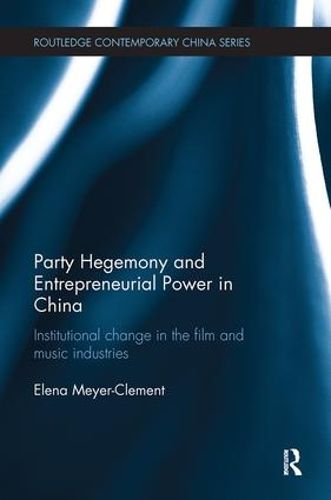Readings Newsletter
Become a Readings Member to make your shopping experience even easier.
Sign in or sign up for free!
You’re not far away from qualifying for FREE standard shipping within Australia
You’ve qualified for FREE standard shipping within Australia
The cart is loading…






Economic liberalisation processes and the rapid development of the private sector are widely visible signs of over thirty years of reform policies in the People’s Republic of China. Nevertheless, the Chinese Communist Party (CCP) has managed to preserve the basic political institutions of the Leninist Party-state, including its own unrestrained position of political power. Against this background, this book investigates the interrelationship between processes of marketisation and commercialisation, and the stability of the CCP regime.
The aim of the book is to complement existing literature on adaptive governance in China and on the reasons for the CCP regime’s relative stability, while providing new information about the relationship between the Chinese party-state and private entrepreneurs. Taking case studies from the film and music industries, the book gives a detailed account of the political and economic history of these industries in China, with special attention given to the role played by private production companies as intermediaries between artistic creation, political and ideological constraints, and the market. A historical institutionalist approach is employed to trace the effect of Chinese policies on popular culture and the institutions of administrative, economic, political and ideological control over the film and music industries back to the 1950s, revealing the mechanisms and prospects of CCP hegemony in the cultural sector.
Examining the effects of the marketisation and commercialisation processes on the communist regime and vice versa, this book also offers a fresh perspective on the origins of today’s Chinese popular cultural mainstream. It will therefore be of great interest to students and scholars of Chinese politics, Chinese culture and media and Chinese government-business relations.
$9.00 standard shipping within Australia
FREE standard shipping within Australia for orders over $100.00
Express & International shipping calculated at checkout
Economic liberalisation processes and the rapid development of the private sector are widely visible signs of over thirty years of reform policies in the People’s Republic of China. Nevertheless, the Chinese Communist Party (CCP) has managed to preserve the basic political institutions of the Leninist Party-state, including its own unrestrained position of political power. Against this background, this book investigates the interrelationship between processes of marketisation and commercialisation, and the stability of the CCP regime.
The aim of the book is to complement existing literature on adaptive governance in China and on the reasons for the CCP regime’s relative stability, while providing new information about the relationship between the Chinese party-state and private entrepreneurs. Taking case studies from the film and music industries, the book gives a detailed account of the political and economic history of these industries in China, with special attention given to the role played by private production companies as intermediaries between artistic creation, political and ideological constraints, and the market. A historical institutionalist approach is employed to trace the effect of Chinese policies on popular culture and the institutions of administrative, economic, political and ideological control over the film and music industries back to the 1950s, revealing the mechanisms and prospects of CCP hegemony in the cultural sector.
Examining the effects of the marketisation and commercialisation processes on the communist regime and vice versa, this book also offers a fresh perspective on the origins of today’s Chinese popular cultural mainstream. It will therefore be of great interest to students and scholars of Chinese politics, Chinese culture and media and Chinese government-business relations.